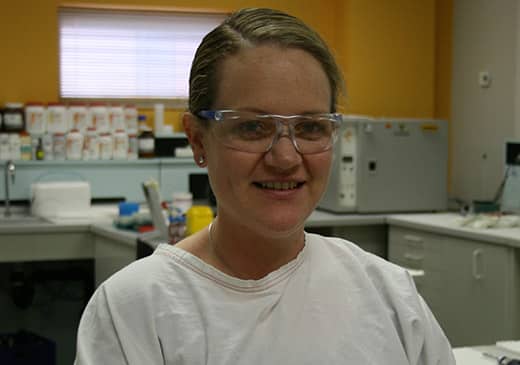
Hunter-based research advancements in melanoma have been recognised by the Cure Cancer Foundation Australia, with University of Newcastle researcher Dr Nikola Bowden* being awarded a two-year grant to continue studying the causes and prognosis of the disease.

Dr Nikola Bowden has secured a Cure Cancer Foundation grant
Hunter-based research advancements in melanoma have been recognised by the Cure Cancer Foundation Australia, with University of Newcastle researcher Dr Nikola Bowden* being awarded a two-year grant to continue studying the causes and prognosis of the disease.
The grant follows a successful project funded by the Cure Cancer Foundation Australia in 2010, in which Dr Bowden identified problems with DNA repair in melanoma.
The next stage of the study will further explore the DNA repair factor, focusing on developing tests to determine melanoma aggression and progression. Ultimately, Dr Bowden hopes to tailor the diagnosis and prognosis for individual melanoma patients.
“There is an idea that melanomas are like other types of cancer but they’re not. Melanomas don’t respond to chemotherapy and unfortunately they have a very low rate of survival,” Dr Bowden said.\
“We know that sun damage causes mutations in our DNA, which usually gets repaired, but nobody knows exactly why the sun causes melanoma. I want to prove that these DNA repair genes are dysfunctional in melanoma.”
The Cure Cancer funding will also allow Dr Bowden’s research team to better determine the severity of a melanoma and provide patients with more accurate estimates of life expectancy. Dr Bowden believes the tests they develop will have a significant impact on melanoma prevention and therapy.
“Testing people for this deficient gene will give doctors more definitive information that allows them to determine the best path of treatment and develop a personalised plan for each of their patients,” Dr Bowden said.
“Doctors will be better able to estimate life expectancy and treatment options, and help patients and their families come to terms with the diagnosis.”
The Hunter Region has one of the highest rates of melanoma in Australia, and Australia has the highest rate in the world.
“This is an important step forward in understanding melanoma,” Dr Bowden said. “While we have a bit of work to do, I’m confident this grant will give us the foundation to one day prevent people from developing melanoma and significantly improve the outcomes for those who suffer from the disease.”
* Dr Nikola Bowden is a member of the HMRI Information Based Medicine and Cancer research programs. HMRI is a partnership between Hunter New England Health, the University of Newcastle and the community.
HMRI would like to acknowledge the Traditional Custodians of the land on which we work and live, the Awabakal and Worimi peoples, and pay our respects to Elders past and present. We recognise and respect their cultural heritage and beliefs and their continued connection to their land.

Hunter Medical Research Institute
We’re taking healthy further.
Locked Bag 1000
New Lambton
NSW, Australia, 2305



This site is protected by reCAPTCHA and the Google Privacy Policy and Terms of Service apply.
Copyright © 2024 Hunter Medical Research Institute | ABN: 27 081 436 919
Site by Marlin Communications
